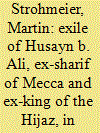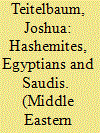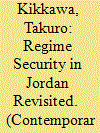| Srl | Item |
| 1 |
ID:
166766


|
|
|
|
|
| Summary/Abstract |
This article deals with the exile of Husayn ibn Ali, ex-sharif of Mecca and ex-king of the Hijaz, in Cyprus (1925–1930). It was not politics, but the adversities of everyday life that shaped the ex-king’s stay in the British colony. Loss of prestige, estrangement, uncertainty about the future, lawsuits, financial problems and the death of his wife contributed to failing health which ultimately led to his relocation to Amman. A special, perhaps unique feature of Husayn’s enforced residence in the island is that the power which exiled him also granted him asylum. This article examines his living conditions, experience with and image in the local community, relations with his sons as well as his dealings with British authorities. In this way the progressive isolation and marginalization of an ex-monarch in exile becomes evident.
|
|
|
|
|
|
|
|
|
|
|
|
|
|
|
|
| 2 |
ID:
174141


|
|
|
|
|
| Summary/Abstract |
Most analyses of the fate of the Hijaz and the Muslim pilgrimage after the First World War have focused on the struggle between Hashemites and Saudis. But in actuality the Egyptians were heavily involved in this dispute, for the Hijaz had been for centuries part of a geopolitical system based on the Red Sea littoral states. Indeed, this was a tripartite struggle, which afforded much more room for maneuver than a simple bilateral one. This article covers the maneuvers of all three parties, demonstrating how they tried to gain possession of the hajj, and all that meant for world Islamic leadership.
|
|
|
|
|
|
|
|
|
|
|
|
|
|
|
|
| 3 |
ID:
180316


|
|
|
|
|
| Summary/Abstract |
Jordan is one of the few authoritarian Arab regimes that survived region-wide mass protests during the Arab Spring, although the monarchy lacked enough force or resources to neutralize the dissident. This study analyzes the source of the resiliency of the Hashemite monarchy during 2011–2020 concerning regime security. The retreat of the Jordanian democratization movements in the early phase of the Arab Spring was the consequence of the opposition’s failure to achieve coordination and alignment, particularly the internal struggle of the Muslim Brotherhood regarding how to respond and its successful co-optation by the government. The scope of regime security in Jordan experienced a dramatic shift from appeasement to coercion around 2014 because of the eroding social order in neighboring states, represented by the influx of Syrian refugees into Jordan and the rise of the Islamic State in Iraq. Actions for securitization against Islamists, namely increased policing and tighter border control, were arranged through coercion and securing mass support in tandem. Jordan’s experience illustrates how this typically “weak state” secured its survival in this unprecedented, rapidly changing security situation.
|
|
|
|
|
|
|
|
|
|
|
|
|
|
|
|